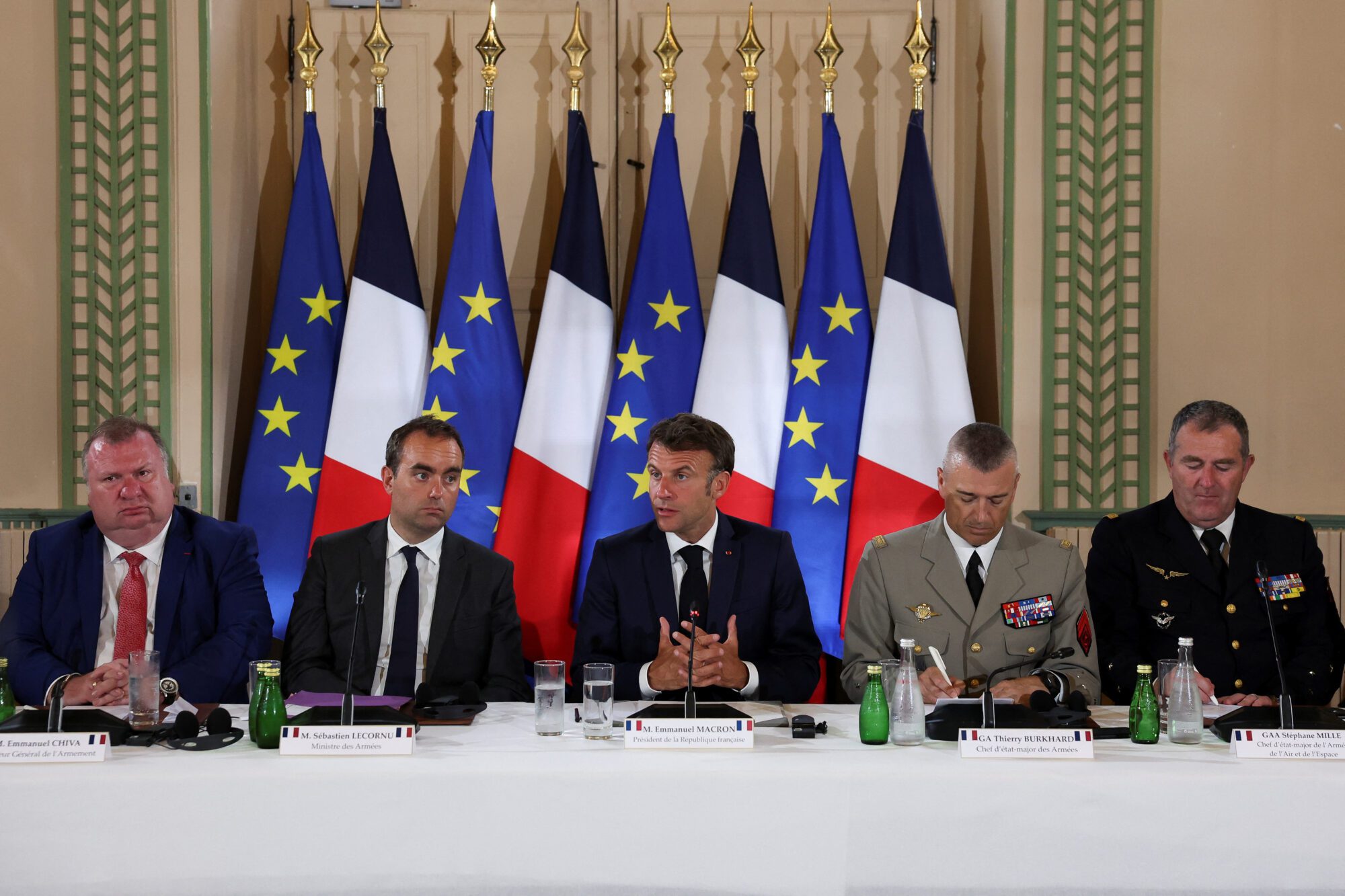
French President Emmanuel Macron flanked by Minister of the Armed Forces Sebastien Lecornu, Chief of the Defence Staff General Thierry Burkhard, General Delegate for Armaments Emmanuel Chiva, and Chief of Staff of the Air and Space Force Stephane Mille, during the conference on European air and missile defense at the Hotel des Invalides in Paris, June 19th, 2023.
STEPHANIE LECOCQ / AFP
On the sidelines of the Salon du Bourget, the bi-annual trade fair and air show held at Paris-Le Bourget airport, the French government on Monday, June 19th, reported some success in convincing allies to jointly procure European-made air defense systems.
The reality of Russia’s missile attacks on Ukraine served to illustrate the need for European nations to procure new defense systems should the conflict in Ukraine widen. While European countries have invested in achieving air superiority through the purchase of fighter jets, their defenses against aircraft (including drones) have been painfully neglected for years.
Last October, a plan addressing this gap had already been formulated by Germany but was promptly criticized by France, which took issue with it as it would make Berlin—together with 14 NATO allies who initially signed onto the initiative— too dependent on the U.S. and Israel, from which they would buy the systems.
Since then, some 17 countries have signed up for Berlin’s so-called European Sky Shield initiative. Its participants include the Netherlands, Finland, Sweden (not a NATO member state), the Baltic states, a couple of Eastern European countries, and the UK.
The focus of the scheme is to strengthen their air defense as soon as possible.
Berlin had decided to go for systems that were already on hand, such as the Israeli Arrow 3—with their very long range, they can intercept ballistic missiles in space or knock out satellites—; the U.S. Patriot (long range); and the newer German IRIS-T system (medium range).
Last week, the Bundestag agreed to spend up to €950 million on six of these IRIS-T systems. In addition, Germany plans to sign a letter of commitment with the Israeli government by the end of 2023 on the procurement of the AWS and Arrow 3 missiles, with a planned initial operational capability by the fourth quarter of 2025, the German Ministry of Defence reported on June 15th.
As an alternative, Paris—perhaps not wholly altruistically since France is among the world’s largest arms exporters—proposed to make full use of Europe’s own defense industry instead.
For instance, the French have pointed out that Franco-Italian Mamba-type anti-aircraft missiles have about the same range as U.S. Patriots. MAMBA systems have also been deployed in Ukraine, which, due to shortages, is finding it increasingly difficult to protect its critical infrastructure, ammo depots, and assorted military hardware from Russian missile strikes.
During his closing speech at the conference on European air and missile defense, which was attended by 20 EU defense ministers, French President Emmanuel Macron noted that he had garnered the interest of some countries.
En février, j’annonçais une conférence sur le futur de la défense aérienne et anti-missiles de l’Europe.
— Emmanuel Macron (@EmmanuelMacron) June 19, 2023
Elle s’est tenue aujourd’hui à Paris.
Pour renforcer notre sécurité collective et notre autonomie, nous devons bâtir ensemble une stratégie commune. pic.twitter.com/wm07X6I2sH
France, Belgium, Cyprus, Estonia, and Hungary had signed a letter of intent for the joint purchase of the French Mistral air defense systems, built by missile producer MBDA, he said.
“When we talk air defense, we would be wrong to rush into (increasing) capacity. The question is first of all strategic,” Macron said, remarking that, “what Ukraine shows is that we can only give Kyiv what we have and produce. What comes from non-European countries is less manageable. It is subject to timetables, priorities and sometimes even authorisations from third countries,” he added.
In the long run, he concluded, echoing a sentiment he voiced earlier this year, the EU needs its own strategic autonomy rather than relying on the U.S. Key to this would be building up Europe’s defense industry and buying from it.
As reported by Reuters, in the Paris meeting, German Defence Minister Boris Pistorius defended Germany’s initiative, which he said posed no competition to NATO, the EU, or even the French one. “Everything that is purchased can be integrated into the existing [NATO] structure,” he said, remarking that his nation’s initiative is “open for additional countries that may want to join.”
